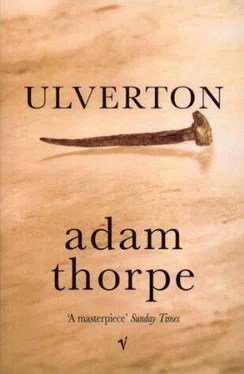Adam Thorpe - Ulverton
Здесь есть возможность читать онлайн «Adam Thorpe - Ulverton» весь текст электронной книги совершенно бесплатно (целиком полную версию без сокращений). В некоторых случаях можно слушать аудио, скачать через торрент в формате fb2 и присутствует краткое содержание. Год выпуска: 2012, ISBN: 2012, Издательство: Random House, Жанр: Современная проза, на английском языке. Описание произведения, (предисловие) а так же отзывы посетителей доступны на портале библиотеки ЛибКат.
- Название:Ulverton
- Автор:
- Издательство:Random House
- Жанр:
- Год:2012
- ISBN:9781448130061
- Рейтинг книги:4 / 5. Голосов: 1
-
Избранное:Добавить в избранное
- Отзывы:
-
Ваша оценка:
- 80
- 1
- 2
- 3
- 4
- 5
Ulverton: краткое содержание, описание и аннотация
Предлагаем к чтению аннотацию, описание, краткое содержание или предисловие (зависит от того, что написал сам автор книги «Ulverton»). Если вы не нашли необходимую информацию о книге — напишите в комментариях, мы постараемся отыскать её.
Told through diaries, sermons, letters, drunken pub conversations and film scripts this is a masterful novel that reconstructs the unrecorded history of England.
Ulverton — читать онлайн бесплатно полную книгу (весь текст) целиком
Ниже представлен текст книги, разбитый по страницам. Система сохранения места последней прочитанной страницы, позволяет с удобством читать онлайн бесплатно книгу «Ulverton», без необходимости каждый раз заново искать на чём Вы остановились. Поставьте закладку, и сможете в любой момент перейти на страницу, на которой закончили чтение.
Интервал:
Закладка:
My uncle having made me of a bookish mind, despite it being viliorated with matters such as dung and mouldiness, I have on my shelves several volumes, of which the most-thumbed is Bunyan’s. His is the pilgrim who names the world a ‘wilderness’, and visits the valley of Humiliation. Perched before the fireside, reading by the glow (as we are low with candles, and my wife had settled early, not wishing to worsen her headache with drawing-up of old holes in old stockings), and still aching from the stilts of the turnwrest which I held for more than an hour while my ploughman rested, and the share too blunt already, and the tilth deep, I noted that, far from being a source of contentment, the pilgrim’s woes matched mine too greatly, and I likened my life to the handling of an oxen team on a chocky, declivous field, with the rooks so loud about me that I could not hear my own breath, or the ploughman shouting from the hedge that the coulter was loose, and but shallow cutting.
Today I went to market and on my return, upon the scarp above Five Elms Farm, that was once old Anne Cobbold’s the witch, I noted one elm to be down, most likely in the January storm, and it being old, and wondered about the name, and that my own farm, being simply Plumm’s, which is my own family title, might lose that title when I pass on, which upset me greatly.
Today we ploughed the last acre. There is much debate at present, among my neighbouring farmers who have come by, over the number of earths that is desirable after naked fallow. I have one field that has lain still for two summers, with only camomile and redweed upon it, being fallowed before I tried the clover and St Foin, and being a field much reduced in richness by my forefathers, who rested it not. It is a loose, spongy ground, and Farmer Barr was of the mind that, were I to plough it up and sow it to one earth, as I had considered, I would have much trouble with the redweed, or poppy. If the land is settled and fast, as it may be after three summers or more, the redweed seed is choked where it is turned under. I told him that I thought it better, then, to wait for rain, which might impact the soil, and render it suitable for one or two earths. Farmer Barr is cursed himself by redweed and is sore on the subject. I left the ploughman to clean and oil this dusk and went inside to ask after my wife, who is again poorly, and to relate to her the advice of Farmer Barr, only to encounter my maid sobbing in the still-room. When asked for the reason of her distress I was met with no answer. Hearing the noise of the bed above I knew my wife was not deceased, which had passed through my mind, and sat down. Her hands were as ice. I took to rubbing them and, seeing her face lighten its load, asked her again. She being a very young girl, and a simple one at that, laid her head in my lap, which was redolent still of the field, and thus we remained for at least a half-hour. What happened following this attempt of comfort I will relate as best my troubled hand can put it down. She arose, closed the door to the kitchen, which rendered it very dark in the still-room, so that I was afraid for the bottles, whereupon I heard a rustling, like the prickles of barley in a wind, and felt a body that was unclothed from the waist down upon my lap, and my breeches unlaced with a dexterous hand before I could render a note of complaint or astonishment. I saw in my mind only the turn of the furrow, the coulter slicing, and the crows with their baleful cries. The Lord forgive me. We broke five bottles: of sallets, of gillyflowers, and three of white lilies.
The aftermass of clover I mowed October last, being kept suitably dry, we thrashed this day, it being clear and warm in the sun, though still middest March, and, after beating the husks again that were separated from the straw, got a goodly seed, fat and rounded, and five bushels of it from the first acre. That field being of seven acres, the whole should be thrashed before the week is out. I flailed for three hours, which eased my thoughts, and gave me much satisfaction.
My wife, it appears, suffers from nothing more than fear, or trepidation. It is plain to me that her last bearing, where she screamed for more than twenty hours, and lost much blood, and the child too, rendered her an invalid in the mind, if not the body: this being the reason she will not have me so much as stroke a hair upon her head. The stick she uses against me at my request, when I am driven to desire for procreation, is now guardian of this aforesaid fear. She is a weak vessel, then, and God has granted me a stronger. This day, being late March, and my seeds-man out in the field already, I am driven to these wild thoughts, that both please and distress me.
This day the cattle have been turned out.
In the dairy, this afternoon, with the door closed, I sought to seed my heir, against a full churn, her hands still ripe with butter, as a ram tups a ewe, but praying all the while I cast. Lord forgive me. A little rain this first week of April. I do not think anyone heard, although the girl’s cries (of pleasure) were hard to silence. We tipped over the churn, and lost, I reckon, a half of our butter.
The nails in the sideboards of the dung-waggon having loosened, and some lost, through the hard motion of the cart on the frozen ruts and also on the declivities of the road likewise stony with frost, I have taken up the advice of Mr Nash and thonged with leather, well greased, the sideboards to the raths and found these to be fast after a week of use. The dung spread in January has not, owing to the dry weather, and only a little rain the first week of April, done much goodness to the soil, by my reckoning, which is owing to the generally dry nature of white land that is not easily taken to drinking up the dung’s juices.
My seeds-man is advanced in years, and I have noted, that having a weakness of the wrist owing to his years, he is apt to back-drop much of the seed, which as he advances is plain to see, and will lead to a thicker run of corn where he broadcasts, and a thinner elsewhere. This seeds-man, having been my labourer at this season for twenty years, must soon be replaced, if an even spread of corn is to be realised henceforward. My cousin at Effley has pointed out the advantages of a seeds-man pacing against the incline of a field, if the field be so out of level, that uphill and downhill he must take short steps, whereas on the level his steps are apt to be lengthened, and so, broadcasting at every step, the seed be spread too thin. Also, if the seeds-man get tired, as he is apt to going up and downhill, his steps will thereby be shorter. The danger, as I did then remark, with both of us watching my seeds-man who did once or twice stumble, and did cover his beard in soil, is that of casting too thick, as with a weak wrist. My cousin agreed, and, doffing his hat that he did then use as a seed-lip, demonstrated to me the correct measurement of the stride, which he had arrived at after much observation on the commons at sowing-time, where are to be seen many seeds-men at once.
On Mr Tull’s seed-drill: this last ten years has seen a score of attempts at the introduction of this invention, which by all accounts is far superior to any seeds-man, and might, it is said, sow three tons of seed at one session. However, the former seedsmen and their companions in labour have withdrawn their labours completely at each attempt, and so simple fear of Improvement, which might increase general profit and feed our nation the better, which in time of war is seen to be more necessary, has miscarried this robust child of science, and so we must suffer weak wrists and wheezing old men.
This day, again, within the cow-house, up amongst the hay, when all the men were harrowing, and the cows at pasture on the leas, the grass being fat enough, I did apply my member to the use it is best made for, which is the making of an heir. The maid did keep her silence, and afterwards spent much time taking hay from her hair, which she wears still loose, and plucking off my shoulders lengths of the hair which had attached themselves to my coat, and which my wife, who is at market, might be made ill-thinking by. I note that upon her left dug, that is the maid’s, a small indentation is to be seen which, when questioned after, she did relate how she was bitten thereupon by a mongrel, who are a curse through the winter months, and most particularly to shepherds. The cow-house tallet, being generally dark at the rear, and we obscured by hay, has several parts in its wall where the sun alights through holes and cracks, and one of these illuminated us quite suddenly and made her cry out when the sun did come and go, as it did, this being a windy April. It was by this light that I examined her more particularly, and spied the bite-mark. It is remarkable how the hay has sufficed overmuch for the winter, much still lying about in heaps, and we deep within it, and the cattle already out to grass. This is owing to the richness of hay from clover, one acre equivalent to six acres of other, wilder, sourer grass, and it being our practice to feed only the oxen with hay beyond January, fearing a harsh winter. I explained as much to the girl, when she had let herself down into the foddering barton, and was picking her way through the dung therein, there being no one about in the yard at that hour, but such husbandry matters do ill please her.
Читать дальшеИнтервал:
Закладка:
Похожие книги на «Ulverton»
Представляем Вашему вниманию похожие книги на «Ulverton» списком для выбора. Мы отобрали схожую по названию и смыслу литературу в надежде предоставить читателям больше вариантов отыскать новые, интересные, ещё непрочитанные произведения.
Обсуждение, отзывы о книге «Ulverton» и просто собственные мнения читателей. Оставьте ваши комментарии, напишите, что Вы думаете о произведении, его смысле или главных героях. Укажите что конкретно понравилось, а что нет, и почему Вы так считаете.










